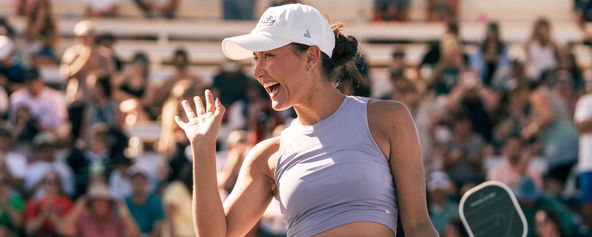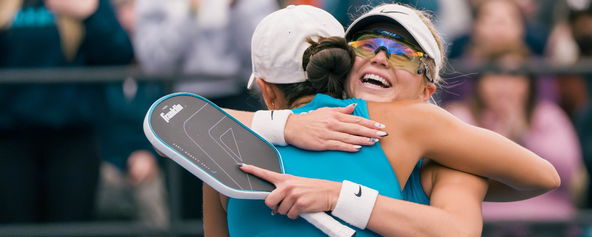
Are tennis players guaranteed pickleball success?
DALLAS, TX – Pro pickleball is full of former tennis players who've made the switch and never looked back.
With the recent announcement that Genie Bouchard and Donald Young are set to make their PPA Tour debuts in January alongside Sam Querrey and Jack Sock, the all-important question is: Are tennis players guaranteed pickleball success?
There’s major buzz around these former tennis stars making the transition to America's fastest-growing sport, and a lot of people are asking whether or not their tennis skills will ultimately faciliate the adaptation proces and yield positive results early on.
I sat down with a few pickleball athletes who boast tennis backgrounds to get their input on the switch.
Connor Garnett
Connor Garnett played collegiate tennis at Santa Clara University, and even hit with top players like Novak Djokovic, Gael Monfils, and Simona Halep at the U.S. Open.
His tennis career appeared to be on the upswing... until the COVID-19 pandemic came along.
He began his full-time career as an investment banker, and eventually started playing pickleball with friends before turning pro in 2022.
“A lot of my tennis skills naturally translated to pickleball,” explained Garnett. “I was able to have this large improvement in a short amount of time. It was really cool just being able to still utilize all those skills that I had from tennis, and then translate them into something new where I could improve a lot and see the progression of my game.”
While Garnett quickly picked up the pickleball basics, some tennis-related instincts seeped into his gameplay. It was both an advantage and a disadvantage on the smaller court.
“When I started playing pickleball, I was doing the two-handed speed-up off the bounce almost any time there was a ball at the kitchen. I didn’t really understand what a dink was,” admitted Garnett.
“As my game developed, I had to learn how to craft the point and create at the kitchen line, which was something that isn’t really that applicable to tennis. It was a new skill that was very different, but a lot of the mechanics of the swings from tennis translated over really well, so it was taking those skills and adding a new shot with them,” he added.
The Bellevue, WA native claims that letting go of his particularly aggressive tennis swings proved difficult at first.
“I might still do this a little bit, but I took huge swings, especially at the kitchen line. From tennis, you want to take these massive swings and it causes you to hit the ball pretty late at times. There’s no need to try and overpower it like that, so that’s definitely something from tennis I had to work on,” confided Garnett.
The bottom line, though, is that “pickleball has a totally different philosophy than tennis.”
“I was always just trying to be aggressive and come in and set up the point. In pickleball, you have to be okay with being very patient, and the points taking longer. There is more of a sequence of shots to set up your point,” he insisted. “In tennis, you can really just develop some big shots and those are how you craft the point. It’s a longer point, even if you are trying to develop weapons.”
Garnett is looking forward to seeing the styles of tennis gameplay that translate more seamlessly on the pickleball court. He believes certain attributes provide a solid foundation for those hanging up in their rackets in favor of a paddle.
“Super-fast pros like Diego Schwartzman would be filthy at pickleball,” shared Garnett. “I think the players who had to grind a little more in tennis, or just have insane feel, would be gnarly in pickleball. Those are the two things that I look at from tennis players and think, 'Holy cow!' You see that touch gets amplified in pickleball. Some of those singles players who can run down everything in tennis are going to be crazy in pickleball.”
Having previously played with Young, Garnett has high expectations for the newcomer.
“Donald has a lot of talent,” he said. “He’s going to be someone to watch out for when he gets on the scene.”
Anna Bright
Anna Bright is a force to be reckoned with on the pickleball court, but on the tennis court, she reached a career-high ranking of No. 13 in the country while attending Cal.
After finishing college, Bright returned home and began playing pickleball with her parents. She soon competed in her first local tournament and was instantly hooked.
“At the start, I was the stereotypical player and banging everything, but I had some talent for the dropping and dinking that makes pickleball unique. It just took a little bit of time to get good at it,” said Bright. “Pickleball and tennis are two different sports, even though a ton of the skills are super transferrable. It takes a little bit of time to get good at some of the shots and skills that are more unique to pickleball.”
With respect to game mechanics, Bright immediately saw some major differences between the two sports.
“The technique on volleys is different. In tennis, you always kind of slice your volleys, but in pickleball, most of the time you’re rolling them and hitting top spin. That’s something that everyone has to learn,” noted Bright.
Given her natural athleticism, however, she was quick to pick up key lessons.
“A lot of the shots don’t exist in tennis, like the one-handed top spin volleys and the flicks like what you see JW Johnson and Ben Johns do,” mentioned Bright.
Naturally, there is a bit of a learning curve for tennis players joining the picklesphere.
Gripping the paddle correctly can take time.
“A lot of modern tennis players play with a western forehand grip, and in pickleball you don’t see any top pros doing that,” said Bright. “The change of the grip on the forehand ground stroke is something that takes some time and is really uncomfortable, too. That was the case for me.”
Fortunately, Bright adapted fast.
“It’s an advantage to have a racket sports background. A lot of the pros have at least a decent tennis background. I don’t know that tennis is necessarily a better background than other racket sports, but you can come in and be a 3.5 for one day, then you’re a 4.0 for half a week, and then you’re already a 4.5. It’s a huge edge to have a racket sports background,” indicated Bright.
Interestingly enough, Bright could have been playing pickleball for a quite a while by now.
In 2015, her community tennis courts were temporarily converted to pickleball courts.
“We were so upset about it and they were always empty. The community was too early,” she explained. “Back then, I hated on it. I thought it was so stupid. They were converted back to tennis courts within about two months, but it’s kind of funny to think about it. I could have played then and been an OG of the game.”
Bright is especially curious to see how Sock’s game evolves in the months to come.
Back in May, she saw his skills first-hand in the mixed doubles final at the PPA Tour's North Carolina Open.
“He was super explosive and really good. Jack was super impressive, and I think it’s gonna be super scary with him playing with Catherine [Parenteau] in mixed. He’ll be a force form the get-go, so that’ll be an exciting team,” praised Bright.
Christian Alshon
Christian Alshon had a successful tennis career at the University of Chicago before turning his attention to pickleball and eventually turning pro in 2022.
“The biggest challenge coming from tennis to pickleball isn’t even the shots,” claimed Alshon. “The biggest struggle for a high-level player is understanding the strategy behind the game and the patterns behind the game. The patterns and strategy in pickleball are not even remotely similar to the way they are in tennis.”
As a former NCAA tennis champ, Alshon had his tennis technique down to a science.
“In tennis, I spent my whole life with a big serve and a big forehand winner. That was my tennis game, and it worked wonders,” explained Alshon.
When switching sports, however, he quickly had to adapt.
“In pickleball, you can’t win a point in two shots like that. You can, but for the most part it takes multiple, like five or six shots, to get yourself into a position to win a point. There’s a lot more strategy that you don’t really get to see right when you join,” mentioned Alshon. “The best way to get past that is to watch pickleball and to play.”
There were some clear advantages that Alshon gained coming from tennis.
“My tennis background definitely contributes to my success in pickleball, specifically my doubles skills in tennis transfer over very well with my eye-hand coordination,” said Alshon.
Pro pickleball in 2024 is certainly going to be an exciting one as more big-name tennis players join the field and navigate the transition.
Want to see Bouchard, Sock, Querrey, and Young at the Masters? Click here to buy tickets.
Related articles

For Hunter Johnson, reaching No. 1 in men’s singles was always the goal
He never lost sight of his primary objective.
17 hours ago
-Victoria Radnothy

Anna Bright is pickleball’s most eligible bachelorette
The UC Berkeley grad reveals what dating is really like on the pro circuit.
5 days ago
-Victoria Radnothy

Waters, Bright partnership embodies true spirit of Galentine’s Day
After a rocky start, their friendship keeps growing stronger and sweeter.
6 days ago
-Victoria Radnothy

Powerball joins PPA State Championship Series as title sponsor
'Powerball Championship Court' will also play host to top pro action at the 2026 Pickleball World Championships.
9 days ago
-Pickleball.com Staff